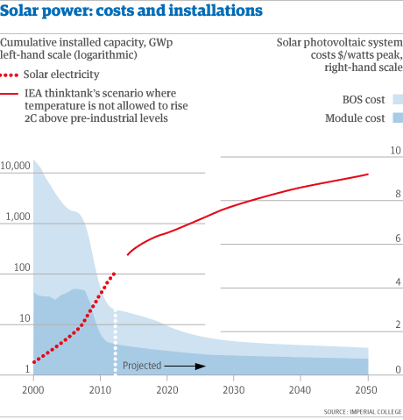Ten million homes in the UK should have their roofs covered with
solar panels in the next six years, if the country is to fulfil its
renewable energy potential, energy experts said on Wednesday. That
number - of more than a third of households generating energy from the
sun - would allow the UK to produce about 6% of its annual electricity
needs from solar power, with as much as 40% coming from the panels on
sunny days in summer, by 2020. These figures are comparable to those of
Germany, which has made a major push on solar power in the last decade.
Installing
more solar panels brings the costs of the technology down dramatically,
because of economies of scale, as the example of Germany and other
countries shows. By 2030, the cost of solar should be comparable to that
of even the dirtiest forms of coal, and of gas, said Ajay Gambhir, of
Imperial College London. Nearly half a million homes in the UK have solar panels installed today, recent figures show.

At present, the cost of solar power in Germany is about Euro cents
10 per kilowatt hour, compared with about 6 to 8 Euro cents per kilowatt
hour for “brown” coal – the most carbon-intensive form of the fuel, but
also the cheapest – and gas. On current trends that should reduce to 6
to 8 Euro cents per kilowatt hour for solar energy by 2030, while the
cost of fossil fuels is expected to stay the same, according to
academics from the Grantham Institute at Imperial College London, who
published a briefing paper on the subject on Wednesday. But
these aspirations will only be met in the UK if the government
spearheads a move to install more solar panels, not just on houses but
also on large public buildings and offices, and through the building of
“solar farms”, in which large arrays of panels cover fields.
Germany
has managed to incorporate renewable power from sun and wind into its
energy mix successfully, thanks in part to the government’s decision in
2011 after the Fukushima nuclear incident to pursue an “energiewende” – a nationwide energy transformation – to remove nuclear power and concentrate more resources on renewable energy. The
UK would face more serious challenges, said the researchers from
Imperial College London’s Grantham Institute, as the incorporation of
renewable energy into the electricity grid has so far been slow. Many
of the UK’s current coal-fired power stations and ageing nuclear
reactors will have to be taken out of service by the end of the decade,
but efforts to replace this generation with renewable power have so far
progressed slowly.
The government began to row back on its commitment on subsidies to households with solar panels in 2011,
scaling down dramatically the 'feed-in tariff' payments available,
which created turmoil in the market. The prime minister, David Cameron,
is alleged last year to have railed against the “green crap”
in energy bills, by which he is understood to have meant charges for
the roll-out of energy efficiency as well as subsidies for renewables. Solar
energy could be in for a massive expansion in the UK, according to the
research from the Grantham Institute, but this would require favourable
policies to encourage the installation of millions more panels on
rooftops across Britain. Modern photovoltaic panels can generate energy
even in cloudy conditions, though they perform better when it is bright.
In
recent weeks, the main focus of government energy generation policy has
been shale gas, which the prime minister spoke out for in Davos, the
annual meeting of the rich and powerful. Ministers have argued that
shale gas exploration could be a major source of indigenous energy.
Source Thegurdian
No comments:
Post a Comment